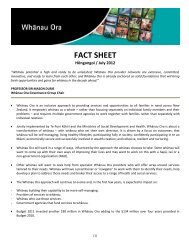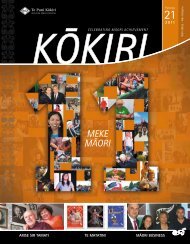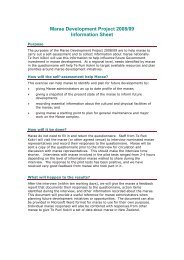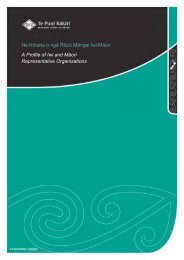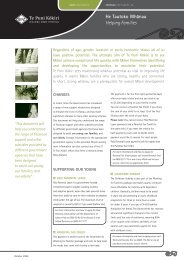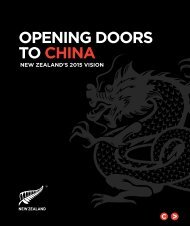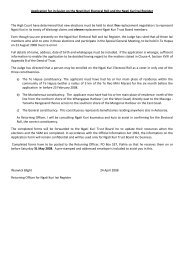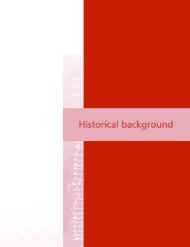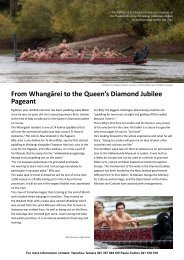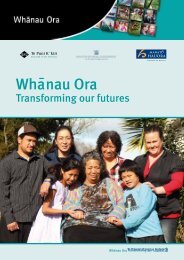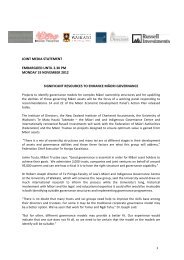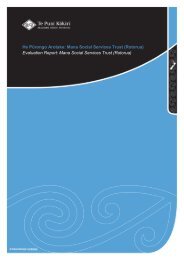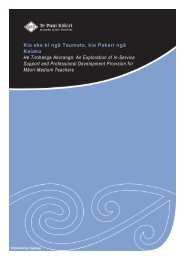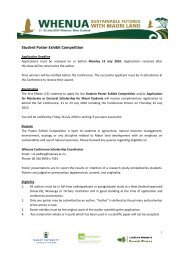He Oranga Hapori: A model for raising Maori ... - Te Puni Kokiri
He Oranga Hapori: A model for raising Maori ... - Te Puni Kokiri
He Oranga Hapori: A model for raising Maori ... - Te Puni Kokiri
- No tags were found...
Create successful ePaper yourself
Turn your PDF publications into a flip-book with our unique Google optimized e-Paper software.
By the standards of his time, Galileo was often willing to change his views in accordance withobservation. In order to per<strong>for</strong>m his experiments, Galileo had to set up standards of lengthand time, so that measurements made on different days and in different laboratories, could becompared in a fashion that could be repeatedly duplicated. This provided a reliable foundationon which to confirm mathematical laws using inductive reasoning.Mätauranga continuumIn the course of their isolation over a period of nearly 1350 years Mäori 12 emerged with theirown view of the world. In the absence of any contact with peoples of different cultures, Mäorideveloped distinctive understandings of the world they occupied. Tüpuna Mäori used theirintellectual knowledge to name and categorise hundreds of plants and species of insects, birdsand animals in Aotearoa New Zealand.Our understanding of Mäori society sits within the mätauranga continuum that has evolved overthe centuries and is encapsulated in the comprehensive definition of the world view offered bythe late Reverend Mäori Marsden.Priest and philosopher, Rev Marsden left <strong>for</strong> our contemplation the following statement on“worldview”:“Cultures pattern perceptions of reality into conceptualisations of what they perceivereality to be; of what is to be regarded as actual, probable, possible or impossible. Theseconceptualisations <strong>for</strong>med what is termed the ‘world view’ of a culture. The World (sic) viewis the central systemisation of conceptions of reality to which members of its culture assentand from which stems their value system. The world view lies at the very heart of the culture,touching, interacting with and strongly influencing every aspect of the culture.” 13<strong>He</strong> complemented this with the following:“(T)he Mäori does not and never has accepted the mechanistic view of the universe whichregards it as a closed system into which nothing can impinge from without.” 14This comment appears to be addressing the approach of Galileo to the exclusion of culturalvariables; suggesting that rather than falling captive to the logic of exclusion where there is noplace <strong>for</strong> kaupapa tuku iho, Mäori call upon the logic of inclusion.A consequence of Mäori refusal to accept the mechanistic view of the universe as described byRev Marsden is that this logic places Mäori society in a position where multiple and alternativeperceptions can be not only entertained but respected. The logic of inclusion emerges.12 Durie, Mason (2003) Launching MäoriFutures p14 Regarding the settlementof these islands, there is DNA and otherevidence that “a significant colony ofMäori settlers was firmly established someeight hundred or so years ago.” by 1200AD.13 Royal, <strong>Te</strong> Ahukaramu (2003) The WovenUniverse: Selected Writings of Rev, MäoriMarsden, pp177-178.14 Royal, p178.15 Whatarangi Winiata, Perspectives onPartnerships – National Library of NewZealand Treaty of Waitangi Seminar,Wellington Feb 1999.Dual economiesDespite the fact that tüpuna Mäori developed complicated religious beliefs and comprehensivevalues systems, there is no Mäori word <strong>for</strong> what we now describe as economics or the economy.We understand that economics is a system of management that provides governments andothers with a framework to manage society.There would be little argument from Mäori whether they are representing whänau, hapü, iwi orsome other röpü Mäori that their people are their wealth. Whilst the accumulation of individualwealth is a primary motivator of western economics; the health and wellbeing of their people isthe compelling factor in <strong>Te</strong> Ao Mäori.The following statement is as true today as it was when Professor Winiata said it at a NationalLibrary seminar in Wellington over a decade ago. 158



